John Hurrell – 15 November, 2013
Darragh's exhibition is motivated by indignant anger that Auckland Council is - as she sees it - banning begging on the streets. The trouble is, that is not what Auckland Council is doing - it is banning ‘Beggars who are deemed intimidating or causing a nuisance'. Something quite different. Okay I guess it depends on who is doing the ‘deeming', but I suspect Darragh is overreacting.
Judy Darragh is usually known for her passion for exuberant colour (often fluoro) in her sculpture and paintings, so it is something of a surprise to see her exhibit photographs of comparatively drab, handwritten, brown cardboard signs. Blown up so they still look striking on the upstairs Two Rooms gallery walls, these seven images are of messages seeking financial assistance, written by homeless mendicants seated on the footpaths of downtown Auckland. (‘Mendicant’ is a word often with religious connotations, but not always; ‘beggar’ to me sounds pejorative.)
Darragh’s exhibition is motivated by indignant anger that Auckland Council is - as she sees it - banning begging on the streets. The trouble is, that is not what Auckland Council is doing - it is banning ‘Beggars who are deemed intimidating or causing a nuisance’. Something quite different. Okay I guess it depends on who is doing the ‘deeming’, and people like say the managers of Smith & Caughey‘s are a worry, but I suspect Darragh is overreacting. If begging were in fact being banned outright, I’d be marching alongside her. It is a fundamental right to be able to ask your fellow citizen for help if you need it, just as it is their right to decline if they wish.
These battered cardboard images, as attempts at self promotion and attracting donations, provide a lot to think about - albeit via rudimentary means. You have the expressive qualities of the language, its tone, register, phrasing and cadences; you have the type of letter font or writing (printing or cursive), upper or lower case, perhaps in bold or drawn over; there is the arrangement of the words - their selection and organisation - plus punctuation, underlining and smiley faces; and there is the medium - biro or felt-tip usually - on torn corrugated carton flaps. Mostly formal aspects that have emotional resonances that are accentuated by the increase in scale.
However it is all very well being analytical and showing the hallmarks of a good (for me in the late-sixties / early seventies, relatively inexpensive) education, but writing and thinking investigatively this way somehow (inadvertently) insults the people who made these functional artefacts - even though Darragh paid them so she could take away their artwork and use it to promote their cause. It (the enormity of this urgent social issue) turns them into things instead of ‘thous’ - to think in terms of Martin Buber.
Even though 10% of sales goes to the Auckland City Mission, talking about these signs seems trivialising. Maybe a higher percentage should be donated. Obviously there is a dilemma, a massive gulf between the artworld, its educational facilities, and dealer galleries that rely on those with surplus funds, and those living on the street with next to nothing; a divide between those with names, brands, reputations and ‘dignity’, and those who are destitute and nameless but who - quite rightly - refuse to become invisible.
John Hurrell
Recent Comments
Owen Pratt
I find an odd parallel between these signs and graphic pornography (scuse the redundancy there). All of the elements are ...
Mark Amery
Hi all, Just to be clear on this. These are different set of signs and whilst the Two Rooms show ...
Daniel Webby
http://www.academia.edu/2531954/The_subject_supposed_to_recycle From local sociology prof Campbell Jones - to paraphrase, how is it that guilt comes to be laid at ...
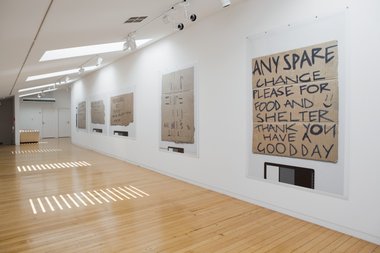
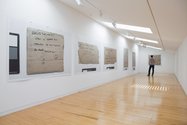
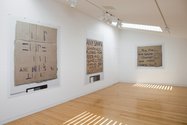
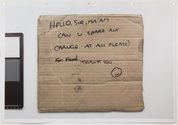
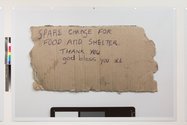
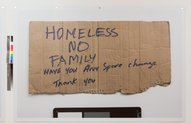


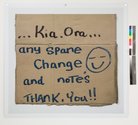

 Two Rooms presents a program of residencies and projects
Two Rooms presents a program of residencies and projects Advertising in this column
Advertising in this column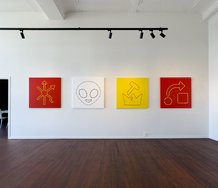
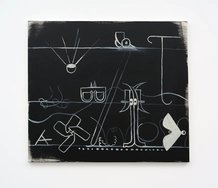
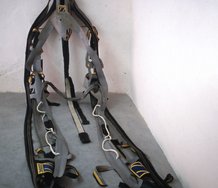
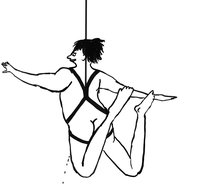
This Discussion has 5 comments.
Comment
John Johnston, 12:40 p.m. 16 November, 2013 #
This is definitely difficult territory to negotiate within a commercial gallery context. It's a situation where, as you put it, the "dilemma" or "gulf" between the artworld and those living on the street is large and obvious.
My thoughts immediately leapt to the quite possible situation of one of these works hanging on a wealthy individual's mansion wall, and many years later being sold at auction for a larger sum of money. Even if some of the sale price goes to the City Mission, the art market context is certainly fraught.
More generally, is this part of the reason we're currently seeing very little political art work being made and exhibited? After all, the gulf between rich and poor is currently wider than it has been for many decades, in many countries.
John Hurrell, 8:43 a.m. 9 December, 2013 #
Here is an interesting development. Darragh is working with Letting Space to auction off the signs and raise money for the City Mission. http://www.lettingspace.org.nz/please-give-generously/
Daniel Webby, 2:49 a.m. 11 December, 2013 #
http://www.academia.edu/2531954/The_subject_supposed_to_recycle
From local sociology prof Campbell Jones - to paraphrase, how is it that guilt comes to be laid at the feet of those with so little ability to address the systemic causes of issues such as excess consumption, or, it could be added, an inability to care for those most in need (not to mention the reasons behind such deprivation). Something of a call to direct attention to (demand responsibility from?) the seats of power, both public and private.
Mark Amery, 12:49 p.m. 13 December, 2013 #
Hi all, Just to be clear on this. These are different set of signs and whilst the Two Rooms show above occurred chronologically earlier the Letting Space commission actually came first i.e. as we understand it the work was developed initially for its site in situ now Imperial lane outside the gallery context, 44 Queen Street. It is not an auction of the Two Rooms work. It is a different set of work employing a different financial system, with the complexities of those financial circulation issues important in its development (NB my words as co-curator rather than the artist's) .
Owen Pratt, 1:59 p.m. 13 December, 2013 #
I find an odd parallel between these signs and graphic pornography (scuse the redundancy there).
All of the elements are there, the shock, the shame,the gaze, the transaction, the receptacles...and the lingering sense of shame and cheapness.
I suppose poverty and porn have always come hand in hand.
Participate
Register to Participate.
Sign in
Sign in to an existing account.